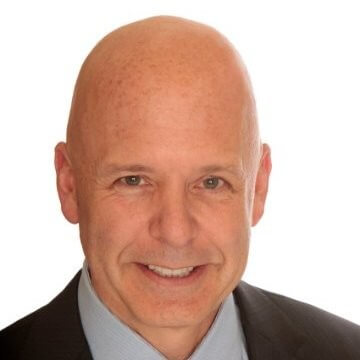
Shep Hyken is the Chief Amazement Officer of Shepard Presentations and a customer service and customer experience expert. He is a National Speakers Association Hall of Fame speaker and a New York Times and Wall Street Journal best-selling author. The following is an excerpt from an interview on The Experience Maker Show, which airs Thursdays at 4 PM Eastern live on LinkedIn and Twitter. It has been edited for length and clarity.
Dan Gingiss: Shep, I’m pretty sure that everybody knows who Shep Hyken is. But give me a little bit of of your resumé anyway.
Shep Hyken: Gosh, I’ve been doing this for for more than three decades. And I know I look very young, but bald guys look young because they don’t show the gray hair. So I’ve been focused on customer service and it kind of morphed into a customer experience when years ago somebody clever said, “let’s just call it customer experience”. And then customer experience became much bigger than just customer service.
And people often confuse the two, but service is inside of experience. Experience is everything that happens with a customer. And here I am today, buddies with Dan Gingiss: and still plowing away, just just making a living, talking to people all over the world. We also have a training company. My trainers go out and deliver content on how to deliver an amazing experience. And so that’s the biz. I also write books.
Dan Gingiss: And you write a lot of books! You want to tell us a little bit about a couple?
Shep Hyken: Sure. The Convenience Revolution came out about a year and a half ago. I love that book. It’s about, all things being equal, if you have a great product and great service, if you are more convenient than your competitor, you’re going to win the business. The Cult Of The Customer is actually a revision of a book I did about 12 years ago. All the stats are updated. There’s new stories in it. There’s a few stories that I felt, even if the companies are getting older and maybe not quite as relevant, their stories were great. I got rid of all the old stats and I even got rid of the guy that is now in jail. I won’t tell you. We had to get rid of him.
Dan Gingiss: Probably a good idea. So just going back to something that you said about the difference between customer service and customer experience. I know one of our mutual friends has often said that customer service is what happens when customer experience fails.
But one of my theories is that the reason we shifted to talk to about customer experience was actually because of social media. Customers got a voice for the first time, a public voice that they could use to talk to companies. And with that voice, they said, “we want a better experience.” And they really threw the gauntlet down to companies and said, this is unacceptable. And because it was public and companies can no longer hide behind terrible service and terrible experience, it became something that they had to focus on.
And so I like to say, “but for social media, we might not be talking as much as we are about customer experience.” What do you say to that?
Shep Hyken: The customer service department is what happens when the experience goes bad. But customer service to me is a philosophy that’s ingrained through an entire organization. The same thing with experience when everybody who plays in that organization understands their role and what they do, and if you journey map even just the top line of where there’s customer interaction, I call that a touchpoint. Then there’s what goes on behind the scenes, which are what I call impact points.
And if you look behind the scenes, virtually every department of any company, and that means every employee of any company, is going to have a role in driving something that’s happening further up line on that touchpoint. With that in mind, everybody has to be mindful of where they are in the service and experience and the role that they play. So the service department happens when experience goes bad. If customer service is not just a department, but a philosophy, now we’re on to the cultural piece of it.
What social media has done to the experience in service is that really everybody can see what’s going on. Our good friend, Jay Baer, says online customer service has become a spectator sport. Everybody can see somebody is complaining about a company, let’s see how they handle it. When we go and look at reviews, there might be 50 reviews and we might find four or five that are negative. And then we look at how the company handled it, how quickly they responded. You can watch it, as if it’s a transcript.
Nobody’s perfect. But when you’re not perfect, you’ve got to show that you handle it. And that’s where the key is, I think. How quickly you respond. You go off line, you fix the problem. You come back on, you thank the customer for letting you work with them. Ideally, the customer comes back and says, “yeah, you’re awesome, thanks.” And then it’s all beautiful. But if nothing else, the rest of the world sees that you did respond. That’s an experience they want to have.
Dan Gingiss: I think you’re absolutely right that the response is is the critical piece. First, that you respond and second, the way that you handle a situation when a customer is unhappy. The remarkable thing about it is it can often turn an unhappy customer into one of your most loyal customers because they need you the most at that moment. And if you’re there for them, it very much can affect their opinion of you going forward.
In almost every business, something goes wrong. People make mistakes, systems fail, whatever it is. And really, no business is immune to that. It’s just being prepared for problems and then being responsive when they happen.
Let’s talk about COVID-19. You and I are both speakers and it’s affected our industry quite a bit because events are being canceled. But I really want to talk about it instead from the perspective of a small- or medium-sized business. How do we communicate with customers? How do we behave similarly or differently because of what’s going on? I know that a lot of companies are struggling with this right now, and I figured who better to ask than Shep Hyken, about what we should do in a situation like this that, frankly, is a scary situation, but also one that most of us have never experienced before. So there’s no playbook for it.
Shep Hyken: There is no playbook. The economy didn’t start to slow down. It hit a brick wall is what it did. And in the end, what happened is this disease, and by the way, I don’t know how to state how important it is that we just recognize the severity of what this is. I mean, we can try to do business the way we want to do business. We can try and be upbeat and we should be and we should do the best that we can. But don’t forget how serious this is.
The first and foremost important thing is health. Beyond that, what can we do to give our customers confidence? And I think the word confidence is most important, because what we want to show them is we’re coming from a position of strength, not of fear.
So in my business, in your business as a speaker, we sent an email out to all of our clients saying unless the government says something that would make us not be able to do what it is we do, I plan to be at your meeting. I recognize you may be making other plans, but just know that I’m not the guy you have to worry about. So that’s the first thing I did is to try to create confidence. Every single client e-mailed me back, thanking me for that statement.
Number two, I made it clear, I will support whatever decision you make and work with you to make sure that your people are healthy and safe. And if you choose to postpone this for another time, I am happy to be on board and be part of that team. And so I look at that is is like I’ve got to practice what I preach.
I think companies need to make friends, not enemies, during this time. And you know what? Maybe they’re going to find a better way to do business as a result of this.

Follow Shep on LinkedIn and Twitter.
Visit Shep’s website.
Shep’s books can be found on The Experience Maker’s Amazon Storefront.
Watch the full interview on YouTube